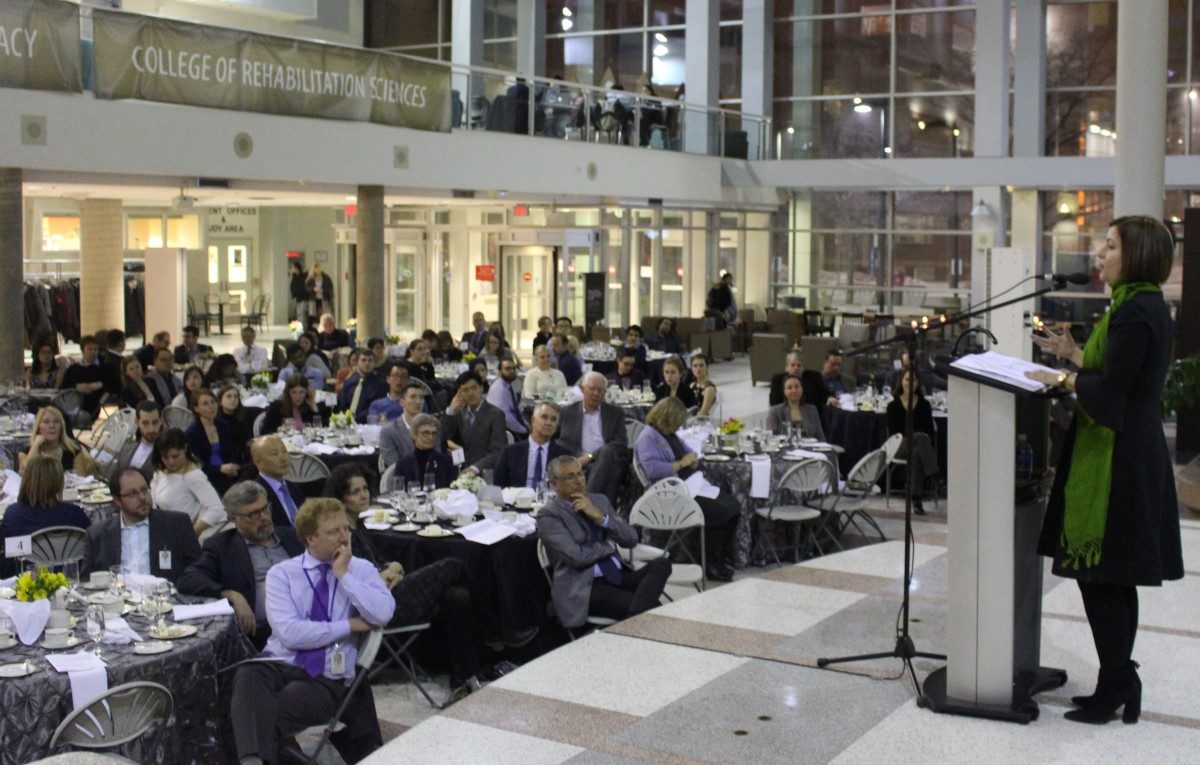
Keynote speaker Dr. Danielle Martin at seventh annual Teacher Recognition and MMSA Awards Dinner.
‘Speak up when something is not right’: author Danielle Martin
One of Canada’s leading advocates for health-care reform wants U of M medical students and faculty to get directly involved in improving the health-care system.
“There is a role for each of us,” Dr. Danielle Martin told an audience of about 180 at the seventh annual Teacher Recognition and Manitoba Medical Students’ Association (MMSA) Awards Dinner on March 7.
The event in the Brodie Centre Atrium on the Bannatyne campus was co-hosted by the MMSA and the Max Rady College of Medicine, Rady Faculty of Health Sciences.
“Quality improvement doesn’t require massive investment. It doesn’t require new legislation. It just requires us to commit to doing something different today than we did yesterday, and to measure the impact,” said Martin, a family doctor who is vice-president of medical affairs and health system solutions at Women’s College Hospital in Toronto.
Martin also teaches in the faculty of medicine at the University of Toronto and co-founded Canadian Doctors for Medicare. She was widely acclaimed for her articulate defence of the Canadian health-care system at a United States Senate Subcommittee hearing in 2014, which went viral on YouTube.
A passionate believer in universal Medicare, Martin is a media commentator on health-care issues and author of the new book Better Now: Six Big Ideas to Improve Health Care for All Canadians.
She called on current and future doctors at the Max Rady College of Medicine to see themselves as part of the health-care infrastructure, not separate from it, and to “engage with governments, sit on hospital committees and speak up when something is not right.”
The “six big ideas” in Better Now are: (1) ensure relationship-based primary health care for every Canadian; (2) include prescription drug coverage under Medicare; (3) reduce unnecessary medical tests and interventions; (4) reorganize health-care delivery to reduce wait times and improve quality; (5) implement a basic income guarantee to alleviate poverty; and (6) scale up successful health-care solutions across the country.
Martin focused her speech on the sixth idea, that of finding ways to “spread and scale” effective local initiatives. Pilot projects that succeed in one community or province should be implemented nationally, she said.
In response to an audience question, the author emphasized the second big idea, that it is time for Canada to provide universal pharmacare.
“Canada is the only country in the developed world that has universal health care that doesn’t include prescription medication,” she noted. “One in five Canadian households reports that someone in that household is not taking their medication as prescribed because of concerns about cost. So we have a major problem in terms of access.”
Overall, Martin’s message was that improvement is already underway. Health-care providers, she said, are “implementing all kinds of creative remedies and innovative techniques, and doing so without having to sacrifice the values that underlie Medicare.”
The awards dinner recognized excellence in medical-school teaching in categories such as innovation, inspiration, mentorship and small-group teaching, as voted on by medical students. Four awards were also presented to medical students who have distinguished themselves in the categories of citizenship, contribution to global health, community service and leadership.






